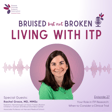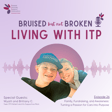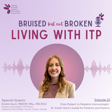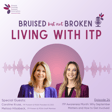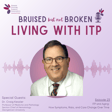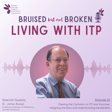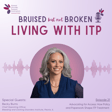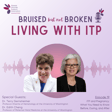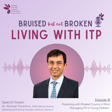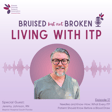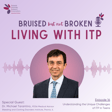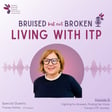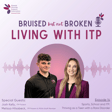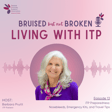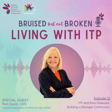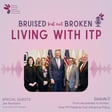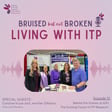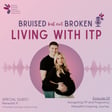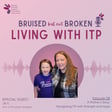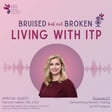Become a Creator today!Start creating today - Share your story with the world!
Start for free
00:00:00
00:00:01

Aging with ITP: Wisdom, Worry and What Matters Most
What does it mean to grow older with ITP and how do you adapt when your body no longer bounces back like it used to? In this episode of Bruised but Not Broken: Living with ITP, host Barbara Pruitt is joined by fellow seniors Lib Elder and Rand Walker for an honest, insightful, and often humorous conversation about aging with immune thrombocytopenia. From treatment changes and brain bleeds to fall risks and advance planning, the trio shares real-life experiences, hard-earned wisdom, and practical advice for navigating ITP later in life. Whether you’ve lived with ITP for decades or are newly diagnosed in your senior years, this episode will leave you feeling informed, seen, and inspired.
Transcript
Introduction to Living with ITP Podcast
00:00:01
Speaker
My brain still says, yeah, go do that thing. That was fun when you did that 25 years ago. And then my body has to say, have you lost your mind? I feel that I can manage the rest of my life with what I have.
00:00:15
Speaker
Welcome to the PDSA podcast, Bruised But Not Broken, Living with ITP. welcome to the pdsa podcast bruised but not broken living with itp The diagnosis of a bleeding disorder like immune thrombocytopenia may leave you wondering, how can I really live my life with ITP?
00:00:37
Speaker
PDSA's podcast, Bruised But Not Broken, Living With ITP, brings empowering stories, the latest research and treatment updates, lifestyle tips, and answers to the real-life questions the ITP community is asking.
Aging with ITP: Experiences and Insights
00:00:52
Speaker
Here's your host for this episode, Barbara Pruitt.
00:01:02
Speaker
Hello and greetings. Okay, so I'm in my 60s. It's actually surprising to me on a couple of levels. You know, because I didn't start off this way. It just kind of sneaks up on you.
00:01:17
Speaker
Getting older is a difficult concept to describe to people that are younger. But then all of a sudden you're in the middle of it. Well, today i want to discuss aging with ITP.
00:01:31
Speaker
And who better to have with me than two other seniors with ITP? So I want to welcome Lib Elder and Rand Walker.
00:01:43
Speaker
Welcome to today's show. Glad to participate. Hello, Barbara. Great to have both of you. So to start off, I briefly want you to each tell me a little bit about your self.
00:01:57
Speaker
your name, how long you've had ITP, where you live and things like that. So Rand, why don't we start with you? Okay. I'm Rand Walker and I'm in my seventies. I live in Columbus, Ohio, and I've lived there for for four years. I've lived in Virginia beach. I've lived in Georgia. I've lived in California. It would have been quite a few places.
00:02:20
Speaker
Okay. And you have had ITP for how long now? So the ITP first episode occurred in February 2023, so a little over two years.
00:02:31
Speaker
Okay. And are you on treatment now? Are you pretty stable as far as your counts are concerned?
Adapting to ITP with Age
00:02:37
Speaker
Yes, I'm on a TPO, and I've been six months after I was diagnosed and had my first episode, um I went on a TPO, and I've been stable since then.
00:02:50
Speaker
Terrific. That's great to hear. Okay, Lib, tell us a little bit about yourself. ah My story's a little longer. My name's Lib Elder. I'm just outside of Raleigh, North Carolina.
00:03:01
Speaker
Late 60s, I was diagnosed when I was 30 and have had a lot of episodes, tried a lot of different treatments. The TPOs are effective for me. The others have been learning experience.
00:03:17
Speaker
Okay. All right. Right now, are you somewhat stable? You're on a TPO of some sort? I am stable right now on a TPO, yes. But I got horrific COVID last year and everything went very wacky and it has taken nearly a year to get things straightened out again.
00:03:37
Speaker
Okay, so perseverance prevails. That's great that you're stable now. And a lot of you already know my story, but I'm Barbara Pruitt. I was diagnosed with ITP when I was four years old.
00:03:50
Speaker
So um I've had 60 plus years of having ITP. I've got a lot of experiences under my wing, and um I live with a platelet count less than 10,000.
00:04:03
Speaker
I am on treatment, but um it doesn't seem to raise my numbers, but it does help my symptoms. So it's obviously doing something. So if you combine all three of us, we've got a lot of years of having ITP.
00:04:17
Speaker
So I think this is going to be a great discussion. So I want to go over some topics that would be particularly beneficial for our senior audience, you know.
00:04:28
Speaker
Nowadays, they say you're a senior if you're 50. I kind of hate that idea, but that's when you get your AARP invitation. But um now in my 60s, I can feel that I'm i'm actually a senior.
00:04:41
Speaker
Let me ask both of you, since you were diagnosed with ITP, has your attitude changed about it? And and what I mean by that is are you more comfortable with your ITP now? have you Are you less fearful? Are you more fearful?
00:04:58
Speaker
Tell me your experience, Rand. Yeah, now I'm very comfortable with the IDP because I've been for little over a year and a half, I've been and stable. um for So definitely at the beginning, um when my numbers were down in seven and 10 and had the you know emergency treatments like that, yeah, I didn't know that there was going to be any hope in the future.
00:05:21
Speaker
and though But once I got on and after three to four months on the TPO, um that kept me, you know, within a range that was above, you know, above the critical stage, yeah, I i i have other medical things which I've now surpassed and made it that IPT I'm i'm very comfortable with. I feel that I can manage the rest of my life um with what I have here.
00:05:45
Speaker
That's great. That's great. And Lib, what about you? i know you've had a lot more experience, but how are you how do you feel towards your ITP now? It's been an interesting ride. um i have always said and still say i have ITP.
00:06:01
Speaker
ITP doesn't have me. um But right I certainly have been told that ITP gets a little more complicated when you get older, that you might bleed more at higher numbers and all that seems to be true in my case.
00:06:19
Speaker
um The TPOs have worked really well for me for the most part, but if something happens that makes stuff get wacky, it takes a lot to get things straightened out again.
00:06:33
Speaker
Yeah, i I
Safety and Precautions for Seniors with ITP
00:06:35
Speaker
understand that. I know from my own experience just getting a cold or something at our age, it takes a bit longer to get over things. And um it's something to try try to get used to because we're so used to bouncing back when we're hit by something and and how it affects your ITP. You know, when you get a cold or a virus or something, it may very well be affecting our ITP.
00:07:00
Speaker
I have to say from my own experience, I think I am, through the years, I've gotten better able to handle my situation, and I'm more comfortable with it. I don't know that you're ever completely comfortable with it because you know it's here, and I know my numbers are very low.
00:07:19
Speaker
But i um I think that, you know, there's certain things that, as a senior, we need to think about. And i kind of hated this when my doctor mentioned to me,
00:07:32
Speaker
you know, you're in your 60s, you need to be concerned about falling and you need to be concerned about tripping over things and you need to be concerned about, you know, your safety is much more in the forefront of your mind. It has to be at your age because you're only going to be getting older.
00:07:52
Speaker
So how do you all feel about that topic? Have you had that conversation with your doctor or have you thought much about that? I have had that conversation with my doctor.
00:08:04
Speaker
um i i might be at a little bit of a sort of a funny advantage. My last name is Elder, so I've always been elderly. And I've always- That's true.
00:08:15
Speaker
Yeah. So that part's not new for me, but yeah, just having to having to get your body and your brain in alignment with each other as to what's appropriate.
00:08:31
Speaker
You know, my brain still says, yeah, go do that thing. That was fun when you did that 25 years ago. And then my body has to say, have you lost your mind? Right.
00:08:42
Speaker
Right. I get that. How about, how about you Rand? Yeah. The, the things about falling and things that might make my get bruised and those kinds of things, which are part of what I do is the ITP. I was a little concerned about the beginning.
00:09:00
Speaker
And it got a little more concerned later when earlier this year I found out I had AFib and I then went on beta blockers and blood thinners. So blood thinners and drug and ITP don't go
Managing ITP Among Other Health Issues
00:09:12
Speaker
to us. So I do have to be concerned about watching my counts a lot better and and also possibly getting, you know, not, you're doing everything so I don't fall.
00:09:25
Speaker
Some the medications I'm on make me a little bit more, make me stable. going up and down stairs are a little more difficult. So I do think about yeah the idea of because things are more happening, I've got a little bit of sciatica now, they combine together in one group of things that you then have to worry about.
00:09:44
Speaker
But I think my because my ITP is more stable, it's the other things that are now more bothering Okay. Well, that's interesting because i think as we get older, we kind of collect more diagnoses.
00:09:59
Speaker
You know, there's always something else that's going to go wrong and you've got to go to a different specialist and all of that. And it's kind of interesting to see where do you rank your ITP when you find it only one diagnosis of a list.
00:10:15
Speaker
So you're saying, Rand, that it's not on the top of your list because you are under control with your ITP. would say my heart situation, my ITP, and the sciatica, of the three major things. Okay. I'm going to be a neurologist because I have tingling in my feet and my hands which might be from the drugs I'm taking. But so, yeah, I would put it yeah i've kind of been in the middle.
00:10:40
Speaker
Okay. And Lib, what about you? I have kind of a different outlook. I'm not in any hurry to die. ah Certainly not suicidal or anything, but I don't fear death.
00:10:54
Speaker
So I don't really let any of it worry me too much.
00:11:01
Speaker
um I do have a lot of other health issues up until, gosh, up until about three weeks ago, was having a lot of pain issues with a a different health thing.
00:11:13
Speaker
And that was always the forefront because it hurt, you know. Right. ITP doesn't hurt. So it's easy to, for me at least, to just not worry much about it. It's largely well controlled with medications. And, you know, if my number's up, it'll be up. That's Yeah, and and with a pain issue, that you can feel, and you can't necessarily feel your ITP.
00:11:37
Speaker
So I understand why that would be at the top of your list. So mentally, it sounds like you've got a good grasp on your ITP and your future and aging. Is that a good assessment of of you, Lib?
00:11:53
Speaker
Yeah. You've got things in perspective. Yeah. Yeah. And I, and I think,
Importance of Medical Identification and Awareness
00:11:58
Speaker
I think I have it pretty much in perspective too. I mean, none of us are going to get out of here alive, right?
00:12:06
Speaker
So we don't have any control over when that end will happen. And, you know, my attitude has always been live your life, love your life and embrace all the beauty out there in the world.
00:12:19
Speaker
And, um, You know, ITP is a part of my journey, definitely. I can't get rid of it. um But there's so much other things in life that we have out there to enjoy.
00:12:31
Speaker
So we just have to keep things in perspective and live safely and um have those conversations with your doctor about, you know, the things that they might be worried about for you, especially as we're getting older.
00:12:46
Speaker
um Falls and trips are, of course, number one, staircases, automobile accidents, all of those things. Question, do you all have on your person anything that identifies you as having ITP?
00:13:06
Speaker
You've got a bracelet. Rand is showing. Yep, have a bracelet. Okay. Liv, do you live dangerously? I got a PDSA. Great. Great. Liv, do you live dangerously?
00:13:17
Speaker
That's exactly what How did I know that? ah How did I know that? Well, you know, right now with the medications working, my numbers are in the normal range, even sometimes high normal.
00:13:30
Speaker
So it doesn't strike me that that's a critical piece of information right now. Well, i I wear a necklace that says I have ITP and I have on it my husband's phone number to reach and I have under ITP, I have bleeder, platelet count less than 7,000 and then sulfa allergy.
00:13:55
Speaker
And I... I wear the necklace and I have that information on there because I figure if I'm not able to communicate or talk, at least somebody would be available to talk and talk somebody through.
00:14:07
Speaker
But um as far as not having on you something that says you have ITP, I think that's really important that you have something on you, Lib, even if it's in your wallet.
00:14:19
Speaker
um Even though your counts are great, you could something could happen and your accounts might plummet. So they do crash fast when they do. And and I do own some tags, you know, medical or tags that have the ITP information on them.
00:14:36
Speaker
I just don't usually wear them, but I, I can see the value in maybe rethinking that part of my yeah motivation or lack of motivation is tied to the fact that I'm not married, I don't have kids, I don't, nobody's but expecting me to come home.
00:14:57
Speaker
Okay. Yeah. Well, I get that. I understand. um One thing we do need to keep in mind though is as we get older and we get more diagnoses and we're being sent to other, you know, professionals, specialists in certain fields,
00:15:15
Speaker
it's very important that we share with them that we have ITP. And whether it's under control or not, you know, I mean, if it's not under control, it's extremely important. But even though you're on medication and you're under control, it's still important for them to know that ITP is your predominant primary diagnosis.
00:15:35
Speaker
and Because the way they treat you, it can be handled differently if they know you have ITP. There's some medications that are gonna interfere with your platelets and you don't wanna be in those. And if the doctor doesn't know you have ITP, they might be prescribing you something that could be you know harmful to you.
00:15:53
Speaker
So that's just- But I admit that didn't occur to It had not occurred to me that if I were unconscious, they should know I have ITP because there are medications that I shouldn't get.
00:16:05
Speaker
That's a good point. Right, right. And Rand, what were you saying? Yeah, I have a number of PDSA brochures, and there's one of them for, I have now six doctors.
00:16:18
Speaker
I have given all of them because three of the six didn't know what IDP were.
Risks of Brain Bleeds and Cognitive Concerns
00:16:23
Speaker
So I've given them those PDSA pamphlets that tells you about what IDP was ah so that they had.
00:16:29
Speaker
And I actually carried them in my car where i if I meet. I have met three people on the street because every seven days a week, I'm wearing a PDSA shirt. Oh, good for you. You're walking advertisement for platelet disorder. Seven shirts. I wear one each day.
00:16:46
Speaker
Wow, that's wonderful, Rand. And ah I myself, through the years, I've had to educate emergency room doctors about ITP and and other specialists about ITP. I don't think that's, unfortunately, it's not uncommon um because we are an orphan disease and, you know, in medical school they don't cover a lot of those orphan diseases in any kind of depth.
00:17:09
Speaker
So, um that's a really good idea to have those little pamphlets to share with with your other doctors. So, now, I know that this is something that nobody likes to talk about, but the monkey on our backs is a brain bleed.
00:17:27
Speaker
That is like the fear, I think, of all ITP patients. It's the fear of every parent who has a child diagnosed with ITP. realistic to be concerned about it, even though the percentage um of patients that actually die of a brain bleed is extremely low, meaning under 5%. It doesn't matter. Somebody has to be that under 5%. And so, we as human beings, you know, your brain will take you to the worst place scenario. So, it is a concern.
00:17:57
Speaker
Have you thought about that very much, Rand? um i did a little bit more once I started on blood thinners. And so, my My heart doctor and I had long discussions about what was there a new number other than 50 that I needed to be sure that I have stayed above? Because blood thinners worked a little bit differently than the drugs a bit. And so, yeah, I did have a discussion about it.
00:18:25
Speaker
But I think I've learned, and I'm an analytic. So, unfortunately, the good thing is I look a lot of the things up on the internet. The bad thing is I look up a lot of things on the internet. Right. So I think once I got through the fact that I could, as long as could manage it and manage my numbers, then I didn't really worry about it.
00:18:44
Speaker
But it is sometimes when I talk to people who are new, or people and they ask me what is IDP and stuff like that, you know, I'll start out and say, well, one of the worst things that can happen, not very much, is that you can have brain bleeds.
00:18:56
Speaker
Just so that they understand that it's, because they look at me and you look fine, you know, other than your white hair and stuff like that. So, yeah. Right. yeah Well, the term brain bleed um kind of gives you an idea of the severity that the condition could present.
00:19:14
Speaker
You know, hopefully we never have to go through that. But um Lib, I know you and I both have had brain bleeds, and I know that yours was more severe than mine. But tell us briefly what happened and how did you handle that and come out of it?
00:19:30
Speaker
Well, I've been extremely fortunate. I've been diagnosed with two brain bleeds. Both of them were subdural, which means that I'm bleeding into the space between brain and skull.
00:19:44
Speaker
I'm not bleeding directly into brain tissue. My understanding is that okay what is blood is pretty caustic. So if you bleed directly into brain tissue,
00:19:55
Speaker
you know, pretty terrifying things can happen. um So that has not been the case with me. But with the two that were diagnosed in both instances, they did CT scans.
00:20:06
Speaker
And the person that read the CT scan said that it looked to them like I had been having them chronically. Chronic brain bleeds is not a phrase you ever want to hear somebody say.
00:20:20
Speaker
You know, in spite of having been been told that and have that label, if you will, And I just don't have the bandwidth to worry all the time, so I don't.
00:20:32
Speaker
True. So did you have any symptoms at the time? The first one I did have symptoms, I had a really bad headache. It was allergy season, and I lived around a lot of really big trees.
00:20:45
Speaker
Hadn't given my headache a thought in the world. It had gone on for several days. But then one night it got so bad that I could not lie down flat. I felt like my head would explode.
00:20:56
Speaker
So I slept in the recliner and my boyfriend got up in the morning and I said, hey, can you drop me off at the doctor's on your way to work? And when I walked in the doctor's office, before they said anything to me, they called an ambulance because apparently I looked too bad. you know, as harem scarum as that is, as alarming as it is to hear,
00:21:24
Speaker
I've come away from it without any any problems. So I consider myself extremely fit.
00:21:33
Speaker
No, you are fortunate. That's great. my My own experience is um I had a brain scan done years ago and they found this benign tumor.
00:21:46
Speaker
And so as a follow-up to that, I get a brain scan every two years just to make sure it's not growing or anything. and you know But it is benign, so I don't want anybody to worry about that. But Having these brain scans every couple of years, about 15 years ago, they did it, and there was evidence of a brain bleed.
00:22:06
Speaker
And this was in my brain, not in the subdural area, but um in my brain. Freaked me out um because, you know, I got the report before I got to see my neurologist.
00:22:19
Speaker
And when I went to see him, he said, no, no, no, listen, this is called a microbleed, okay? It's like having a petechiae on your brain. It was in an area of my brain that did not cause me any symptoms whatsoever. I have no idea when it happened.
00:22:38
Speaker
I had no numbness, no tingling, no headache, no nothing. um Had no idea that it happened, but back of my mind, there was some blood in my brain. And what happens is the tissue right around that area will die where the blood was.
00:22:54
Speaker
So it's kind of like a marker in your brain that, okay, here was a brain bleed at one time. So every two years I get very anxious about having another, you know, brain bleed.
00:23:07
Speaker
Nothing happened, nothing happened until about Four years ago, oh you've had another one. Oh, no. This is setting me into a panic. I go see my neurologist. I bring my husband with me.
00:23:20
Speaker
And I said, what does this mean? Because it's the same scenario. No symptoms, no deficits of any kind. And he said, well, let me tell you something. As people get older, people without ITP can get these little microbleeds.
00:23:38
Speaker
They're not uncommon. Now, I can say because you have ITP, yours were most likely caused because you have ITP and you have such a low platelet count.
00:23:50
Speaker
I said, well, I've got two of them. And I said, should I be worried? what What if I have another one the next time I get it done? He goes, if you had 15 to 20 of them, I might be more concerned.
00:24:03
Speaker
But with just two, i don't want you to worry about it. So that's my experience with the brain bleed. it's real It was really pretty benign, but it did shake me up as far as, oh my gosh, you know, this sounds horrible and it could actually be horrible if it was a lot worse.
00:24:24
Speaker
So, well, with that in mind, I don't know if you all are aware, but there have been studies that have been done about ITP and cognitive decline.
00:24:38
Speaker
Did you know that? No. No. Yeah. I don't really want to know it. I kind of figure if my cognitive decline is happening, it's because I'm getting older.
00:24:50
Speaker
You know, I think a lot of us feel like, okay, we're getting older. We're going to have a cognitive decline. But there have been studies regarding this. And I know even my hematologist is aware of it.
00:25:02
Speaker
And Dr. Craig Kessler, who's at Georgetown University, he's on our medical advisory board. And um in July next month at our PDSA conference, he's going to be speaking specifically about that.
00:25:17
Speaker
And i think that'll be very interesting to hear. I don't know if there's ways we can stave that off or what percentages of people have cognitive decline related to your ITP, but I think it'll be very interesting to hear
Preparing for Future Health Needs
00:25:34
Speaker
about that. And Actually, I'm hoping to get Dr. Kessler on a future podcast so that we can talk about this more in depth.
00:25:44
Speaker
Well, let me ask, are there things that you are kind of concerned about in the future, and is there anything that you've done to prepare for your future? Rand, I'm going let you take that.
00:25:56
Speaker
Okay. Okay. Okay. um There are things I have, but there are things I haven't. And things like i should have a um I should have a living will, I should have a health care power of attorney, those kinds of things.
00:26:14
Speaker
I actually have physical copies of them, but I just haven't done them. I don't know if the procrastination is because i don't want to deal with it. I don't know. I haven't figured that out. um My wife and I have dealt with our our final our final arrangements with the pots and the funeral and stuff like that just because that's we would have done that no matter what I had. i believe um But yeah, I know that there are some things I should be doing. I just, for some reason, just not doing them in that area.
00:26:46
Speaker
I do have a will. I do have a will, but not, and I don't have long-term health care. um But my concern for that is because both my parents and my in-laws have had to use long-term care.
00:27:01
Speaker
Yeah. And I even used to have my my life and health ah license, and I sold other people long-term care, but I haven't got one myself. Well, I think it's... I don't know.
00:27:12
Speaker
I don't know. I think avoidance is not uncommon. People sometimes, you know, what makes them uncomfortable, they don't want to delve into. And um I think it's something we all need to think about and handle it the best we can.
00:27:29
Speaker
So, Liv, I have a feeling you've not done this. Am I correct? Yes. Yes and no. i do have a will. yeah um I had health care power of our attorney and all the those things when I was married. But now that I'm single and I don't have kids and I don't have family that lives in the same state or even nearby,
00:27:53
Speaker
ah I don't have anybody that I feel is appropriate to ah assume those responsibilities for me. I'm not sure if I wind up hospitalized here with something horrible and I'm in North Carolina, that my brother in Colorado is really going to be able to do anything.
00:28:12
Speaker
And he's the only person I could could have for those things. i I might be mistaken, but I... I think you can also designate a friend um you can instead of a family member.
00:28:25
Speaker
Yeah, yeah can't you can. just but But, ah you know, I mean that that could and moved to this new community right when COVID was at its worst. And they have people I know here. i have acquaintances, but I don't really have a friend base at this point.
00:28:44
Speaker
Knowing that I would feel comfortable making those decisions.
00:28:49
Speaker
Right, right. You said one thing that triggered for me. my My youngest sister is 15 years younger than I am, and the next sister is five years years younger, and the next sister is one year younger.
00:29:02
Speaker
so And that youngest sister 15 years, she's kind of the leader in our family. She takes charge of everything. She took charge of this whole week that we're here up in the lake.
00:29:14
Speaker
um And maybe that's one thing you know that I know that i do have family. that if there's something that happens that but I know that they'll take it. They've already said, Danny and debbie or Darla have already said, you know, we're here if you need us, if your health care gets any worse.
00:29:30
Speaker
Well, that's good to have somebody like that in your family that kind of takes charge. Because oftentimes a spouse or close loved one finds it difficult to handle these type of um situations when when they're needed because of the personal relationship is so strong and they don't want to see the wrong decision be made. It's a difficult thing to think about.
Community Support and PDSA Involvement
00:29:56
Speaker
Well, you all have given us, I think, a lot of insight and hopefully answered some questions that some of our senior ITP members might have.
00:30:07
Speaker
I really thank you for for being here and and being able to participate in this discussion. I know in our at our annual conference, we do have, there's usually always a section that is specifically designed for seniors.
00:30:25
Speaker
And the first year it was offered, it was like, oh, well, that's not for me. But actually it was for me. and So I did go and and, you know, listen and participate. And and it's important information for us. i think there's You know, it's great that at the conference they have, you know, sessions that are just for the teenagers and just for women's issues and now for seniors. And I think that's terrific the way that they're able to divide some of the attention into the different demographics of our group.
00:30:56
Speaker
So um I want to thank you all again for being here. and If you've not, our listening audience, if you haven't been to one of our PDSA conferences, it's not too late to register.
00:31:10
Speaker
It's going to be in Philadelphia this year at the end of at the end of July, and this is 2025. I know that this podcast will be in our library for years to come. So, um,
00:31:23
Speaker
Don't think by missing this conference, you can't go to another one because our conferences are annual and they're always seem to be at the end of July. What do you two say about going to the conferences? Just give me your input on what you think.
00:31:37
Speaker
You can't do it too many times. There's always something new. When I went to Chicago two two summers ago, that was actually the I have a difficulty talking about this. I was actually the first time I met someone with ITP.
00:31:53
Speaker
And so it was ah very much an opening for me. And when i when I met there were children and I met some of the children there who had ITP, it was so emotional for me.
00:32:11
Speaker
And it was at that point, I think I talked to Jody or somebody and invited me to to come to the facilitators meeting. And I right away decided, I want to be sure that anybody who has ITP, so actually my last support meeting, ah we had someone new there and she had never met anyone with ITP and she was also emotional.
00:32:37
Speaker
And so that's why my commitment to helping any way I can, that's what I'm going to do. That's why I'm involved in the hill Hill representations and those kinds of things.
00:32:49
Speaker
Well, thank you, Rand. Your help is immensely appreciated, I know. And this is a wonderful way to give back to our community. And it's very much appreciated. So thank you for that.
00:33:01
Speaker
And again, both of you, thank you again. and um I hope that our listening audience has learned something. And please keep in touch. We hope we you continue to learn from us and and the stories that we share and the professionals that share their information with us.
00:33:19
Speaker
Thank you, Barbara, for doing
Advice for Living Safely with ITP
00:33:20
Speaker
this. I appreciate it.
00:33:31
Speaker
How do you live your life with a bleeding disorder like ITP? From working in the kitchen with knives, to navigating sharp corners in your house, going out to eat in a restaurant, traveling on a plane, attending a sporting event, even dancing at a wedding.
00:33:47
Speaker
ITP patient Barbara Pruitt shares her tips and tricks for moving through life with ITP for more than 60 years. Here's her lifestyle lesson for the day.
00:34:01
Speaker
Well, you've just listened to our podcast on aging and ITP. And early on, I mentioned how age just sneaks up on you.
00:34:12
Speaker
Just because you are, quote, a senior, doesn't mean that you're going to think like one. In my brain, I still think I'm like 45 years old, even though my body 60 years plus.
00:34:29
Speaker
We don't see our thoughts aging though. And unfortunately, our bodies are aging. This can be dangerous because when we're thinking like a 45-year-old, we think we can do things like a 45-year-old.
00:34:46
Speaker
Well, not true. Let me give you an example. I had to put something away in my garage on a high shelf.
00:34:57
Speaker
I didn't want to bother with the ladder because and every time I pick it up, I end up bumping myself and bruising myself, and I figured out the heck with it. So I decided to stand on the stool at my husband's workbench.
00:35:14
Speaker
And you probably guessed it, I fell. Fortunately, i only had a few bruises. But with ITP, it could have been much worse, even fatal.
00:35:32
Speaker
It's all because I was thinking like a I-can-do-it 45-year-old. I'm not saying not to think like a 45-year-old man or a 45-year-old woman.
00:35:48
Speaker
Thinking young is great. I think it keeps you young. But we have a reason to be more cautious. Learn from my own stupidity so you don't injure yourself.
00:36:03
Speaker
Realize that as we age, our balance may not be as good. We may not be able to do the things that we did when we were 45, even though we think we can.
00:36:15
Speaker
And our judgment is probably trying to reflect what we could do as a 45-year-old. So we need to change that into what our actual age is.
00:36:29
Speaker
So my advice is very simple, and this is for people with or without ITP. Just be very careful out there and safe.
00:36:45
Speaker
So until next time, I'm wishing you lots of healthy platelets.
00:36:59
Speaker
Thanks for listening to the PDSA podcast, Bruised But Not Broken, Living with ITP. Made possible by our presenting sponsor, Amgen.
00:37:10
Speaker
Special thanks to Gus Majorga for composing our theme music.
00:37:15
Speaker
To see what's coming up, visit our website at pdsa.org and subscribe wherever you get your podcasts. Please share this podcast through social media with anyone who you think might benefit from the information and stories we share with the ITP and other platelet disorders community.
00:37:33
Speaker
As always, please speak with a healthcare professional before making any treatment decisions. But know that PDSA.org is a wealth of information and resources to help you navigate life with ITP and other platelet disorders.
00:37:50
Speaker
Remember, you are not alone.
